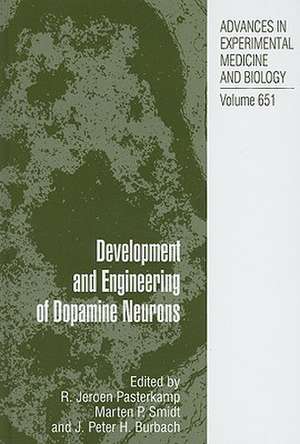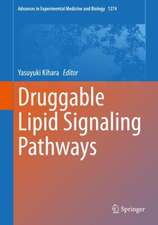Development and Engineering of Dopamine Neurons: Advances in Experimental Medicine and Biology, cartea 561
Editat de Jeroen Pasterkamp, Marten P. Smidt, J. Peter H. Burbachen Limba Engleză Hardback – 4 iun 2009
| Toate formatele și edițiile | Preț | Express |
|---|---|---|
| Paperback (1) | 1067.90 lei 6-8 săpt. | |
| Springer – 9 dec 2014 | 1067.90 lei 6-8 săpt. | |
| Hardback (1) | 1075.43 lei 6-8 săpt. | |
| Springer – 4 iun 2009 | 1075.43 lei 6-8 săpt. |
Din seria Advances in Experimental Medicine and Biology
- 9%
 Preț: 719.56 lei
Preț: 719.56 lei - 5%
 Preț: 1095.03 lei
Preț: 1095.03 lei - 20%
 Preț: 691.93 lei
Preț: 691.93 lei - 5%
 Preț: 704.94 lei
Preț: 704.94 lei - 5%
 Preț: 704.94 lei
Preț: 704.94 lei - 5%
 Preț: 703.32 lei
Preț: 703.32 lei - 5%
 Preț: 704.22 lei
Preț: 704.22 lei - 5%
 Preț: 239.86 lei
Preț: 239.86 lei -
 Preț: 642.95 lei
Preț: 642.95 lei - 5%
 Preț: 820.42 lei
Preț: 820.42 lei - 5%
 Preț: 703.67 lei
Preț: 703.67 lei - 15%
 Preț: 629.45 lei
Preț: 629.45 lei - 15%
 Preț: 630.60 lei
Preț: 630.60 lei - 5%
 Preț: 1013.60 lei
Preț: 1013.60 lei - 5%
 Preț: 704.22 lei
Preț: 704.22 lei - 5%
 Preț: 705.14 lei
Preț: 705.14 lei - 20%
 Preț: 1142.10 lei
Preț: 1142.10 lei - 5%
 Preț: 1150.76 lei
Preț: 1150.76 lei - 18%
 Preț: 1100.97 lei
Preț: 1100.97 lei - 5%
 Preț: 1266.72 lei
Preț: 1266.72 lei - 5%
 Preț: 1145.01 lei
Preț: 1145.01 lei - 5%
 Preț: 1083.16 lei
Preț: 1083.16 lei - 18%
 Preț: 1104.69 lei
Preț: 1104.69 lei - 5%
 Preț: 1411.39 lei
Preț: 1411.39 lei - 20%
 Preț: 1026.46 lei
Preț: 1026.46 lei - 18%
 Preț: 930.42 lei
Preț: 930.42 lei - 5%
 Preț: 292.57 lei
Preț: 292.57 lei - 18%
 Preț: 941.47 lei
Preț: 941.47 lei - 18%
 Preț: 1214.88 lei
Preț: 1214.88 lei - 5%
 Preț: 1210.77 lei
Preț: 1210.77 lei - 5%
 Preț: 1270.49 lei
Preț: 1270.49 lei - 5%
 Preț: 1083.51 lei
Preț: 1083.51 lei - 18%
 Preț: 1113.70 lei
Preț: 1113.70 lei - 5%
 Preț: 1145.52 lei
Preț: 1145.52 lei - 5%
 Preț: 1394.53 lei
Preț: 1394.53 lei - 5%
 Preț: 1283.60 lei
Preț: 1283.60 lei - 18%
 Preț: 1393.77 lei
Preț: 1393.77 lei - 18%
 Preț: 1402.55 lei
Preț: 1402.55 lei - 24%
 Preț: 806.15 lei
Preț: 806.15 lei - 18%
 Preț: 1222.29 lei
Preț: 1222.29 lei - 5%
 Preț: 1405.29 lei
Preț: 1405.29 lei - 5%
 Preț: 1591.34 lei
Preț: 1591.34 lei - 5%
 Preț: 1283.09 lei
Preț: 1283.09 lei - 18%
 Preț: 1105.93 lei
Preț: 1105.93 lei - 5%
 Preț: 1079.03 lei
Preț: 1079.03 lei - 15%
 Preț: 638.91 lei
Preț: 638.91 lei - 5%
 Preț: 1079.03 lei
Preț: 1079.03 lei - 18%
 Preț: 929.84 lei
Preț: 929.84 lei
Preț: 1075.43 lei
Preț vechi: 1132.04 lei
-5% Nou
Puncte Express: 1613
Preț estimativ în valută:
205.88€ • 211.73$ • 170.80£
205.88€ • 211.73$ • 170.80£
Carte tipărită la comandă
Livrare economică 18 februarie-04 martie
Preluare comenzi: 021 569.72.76
Specificații
ISBN-13: 9781441903211
ISBN-10: 1441903216
Pagini: 127
Ilustrații: XVIII, 127 p.
Dimensiuni: 178 x 254 x 13 mm
Greutate: 0.41 kg
Ediția:2009
Editura: Springer
Colecția Springer
Seria Advances in Experimental Medicine and Biology
Locul publicării:New York, NY, United States
ISBN-10: 1441903216
Pagini: 127
Ilustrații: XVIII, 127 p.
Dimensiuni: 178 x 254 x 13 mm
Greutate: 0.41 kg
Ediția:2009
Editura: Springer
Colecția Springer
Seria Advances in Experimental Medicine and Biology
Locul publicării:New York, NY, United States
Public țintă
ResearchCuprins
Development of the Dopamine Systems in Zebrafish.- Dopamine Systems in the Forebrain.- The Role of Otx Genes in Progenitor Domains of Ventral Midbrain.- Terminal Differentiation of Mesodiencephalic Dopaminergic Neurons:.- Foxa1 and Foxa2 Transcription Factors Regulate Differentiation of Midbrain Dopaminergic Neurons.- Transcriptional Regulation of Their Survival:.- Neurotrophic Support of Midbrain Dopaminergic Neurons.- TGF-? in Dopamine Neuron Development, Maintenance and Neuroprotection.- Axon Guidance in the Dopamine System.- Protocols for Generating ES Cell-Derived Dopamine Neurons.- Molecular and Cellular Determinants for Generating ES-Cell Derived Dopamine Neurons for Cell Therapy.
Notă biografică
R. Jeroen Pasterkamp is an Assistant Professor at the Rudolf Magnus
Institute of Neuroscience, Department of Neuroscience and Pharmacology, University
Medical Center Utrecht, Utrecht, The Netherlands. The focus of his laboratory is
directed towards understanding the molecular and intracellular signaling events
involved in the formation of neuronal connections with a particular focus on the
developing dopamine system. His research team concentrates on the developing
mouse embryo using an integrated approach involving molecular biology, cell biology,
in vivo functional proteomics, and mouse genetics. He received his PhD from
the Netherlands Institute for Neurosciences (Amsterdam, The Netherlands) and
did his Postdoctoral at the Department of Neuroscience, Johns Hopkins University
School of Medicine, Baltimore, USA.
Marten Smidt is an Associate Professor at the Rudolf Magnus Institute
of Neuroscience, Department of Neuroscience and Pharmacology, University
Medical Center Utrecht, Utrecht, The Netherlands. The focus of his laboratory is
directed towards understanding the developmental processes that underlie neuronal
differentiation and specification. The main focus has been the development of
mesodiencephalic dopamine neurons. The work includes mouse genetics, molecular
genetics and molecular biology. Marten Smidt received his PhD from the University
of Groningen (Groningen, The Netherlands) and did his postdoctoral at Utrecht
University, Department of Medical Pharmacology, Rudolf Magnus Institute of
Neuroscience (Utrecht, The Netherlands).
J. Peter H. Burbach is professor of Molecular Neuroscience at Utrecht
University and head of the Department of Neuroscience and Pharmacology, Rudolf
Magnus Institute of Neuroscience, University Medical Center Utrecht, Utrecht, The
Netherlands. His research interests concern the role of transcriptionfactors in development and regulation of peptidergic and dopaminergic neurons, and the molecular
mechanisms of human neurodevelopmental disorders. He received his PhD from
Utrecht University and did postdoctoral work at the Clinical Research Institute of
Montreal, Canada. He obtained professorships in Molecular Biology and Molecular
Neuroendocrinology. Since 2001 he is a Summer scientist at the Marine Biological
Laboratory, Woods Hole, MA, USA.
Institute of Neuroscience, Department of Neuroscience and Pharmacology, University
Medical Center Utrecht, Utrecht, The Netherlands. The focus of his laboratory is
directed towards understanding the molecular and intracellular signaling events
involved in the formation of neuronal connections with a particular focus on the
developing dopamine system. His research team concentrates on the developing
mouse embryo using an integrated approach involving molecular biology, cell biology,
in vivo functional proteomics, and mouse genetics. He received his PhD from
the Netherlands Institute for Neurosciences (Amsterdam, The Netherlands) and
did his Postdoctoral at the Department of Neuroscience, Johns Hopkins University
School of Medicine, Baltimore, USA.
Marten Smidt is an Associate Professor at the Rudolf Magnus Institute
of Neuroscience, Department of Neuroscience and Pharmacology, University
Medical Center Utrecht, Utrecht, The Netherlands. The focus of his laboratory is
directed towards understanding the developmental processes that underlie neuronal
differentiation and specification. The main focus has been the development of
mesodiencephalic dopamine neurons. The work includes mouse genetics, molecular
genetics and molecular biology. Marten Smidt received his PhD from the University
of Groningen (Groningen, The Netherlands) and did his postdoctoral at Utrecht
University, Department of Medical Pharmacology, Rudolf Magnus Institute of
Neuroscience (Utrecht, The Netherlands).
J. Peter H. Burbach is professor of Molecular Neuroscience at Utrecht
University and head of the Department of Neuroscience and Pharmacology, Rudolf
Magnus Institute of Neuroscience, University Medical Center Utrecht, Utrecht, The
Netherlands. His research interests concern the role of transcriptionfactors in development and regulation of peptidergic and dopaminergic neurons, and the molecular
mechanisms of human neurodevelopmental disorders. He received his PhD from
Utrecht University and did postdoctoral work at the Clinical Research Institute of
Montreal, Canada. He obtained professorships in Molecular Biology and Molecular
Neuroendocrinology. Since 2001 he is a Summer scientist at the Marine Biological
Laboratory, Woods Hole, MA, USA.
















